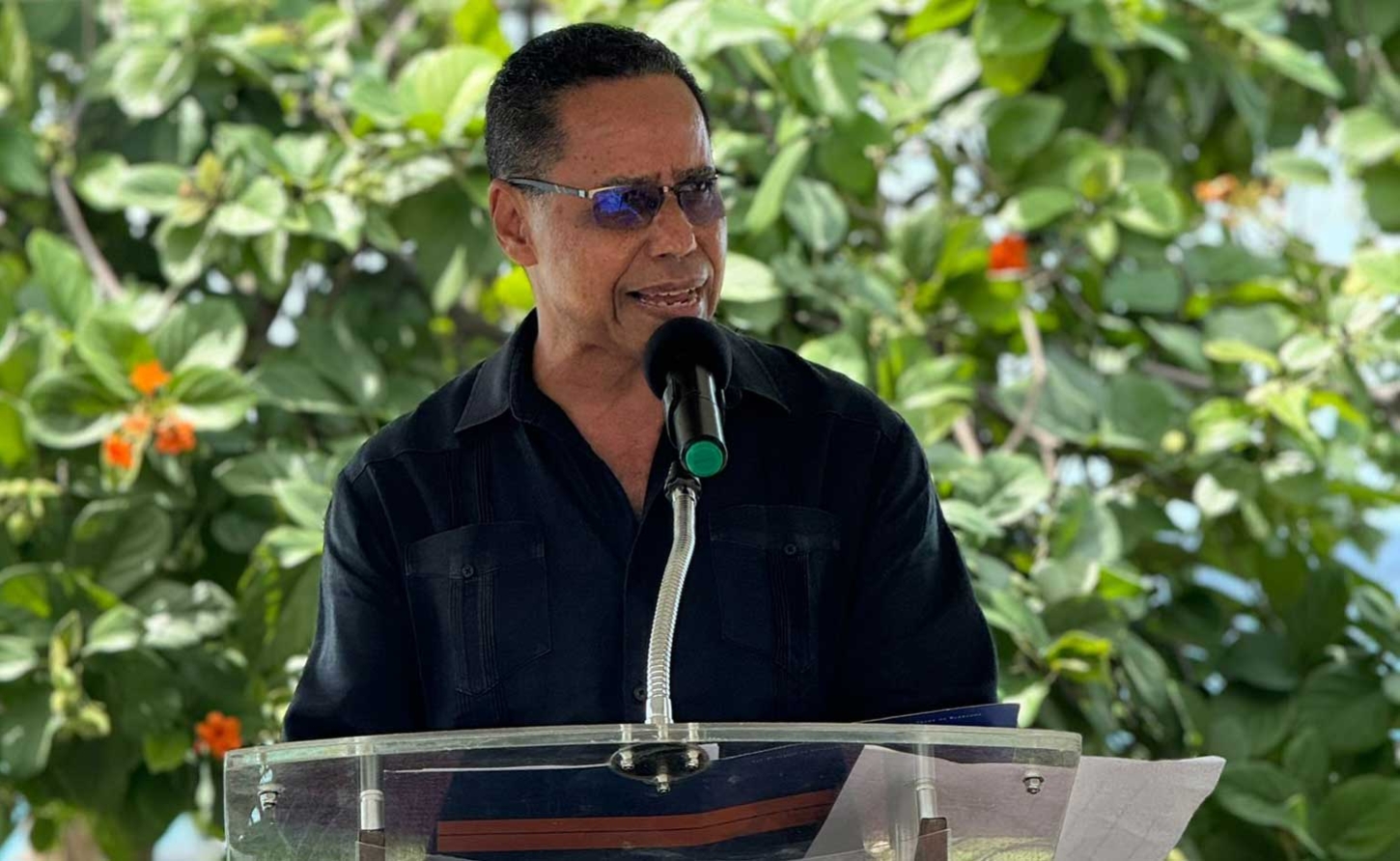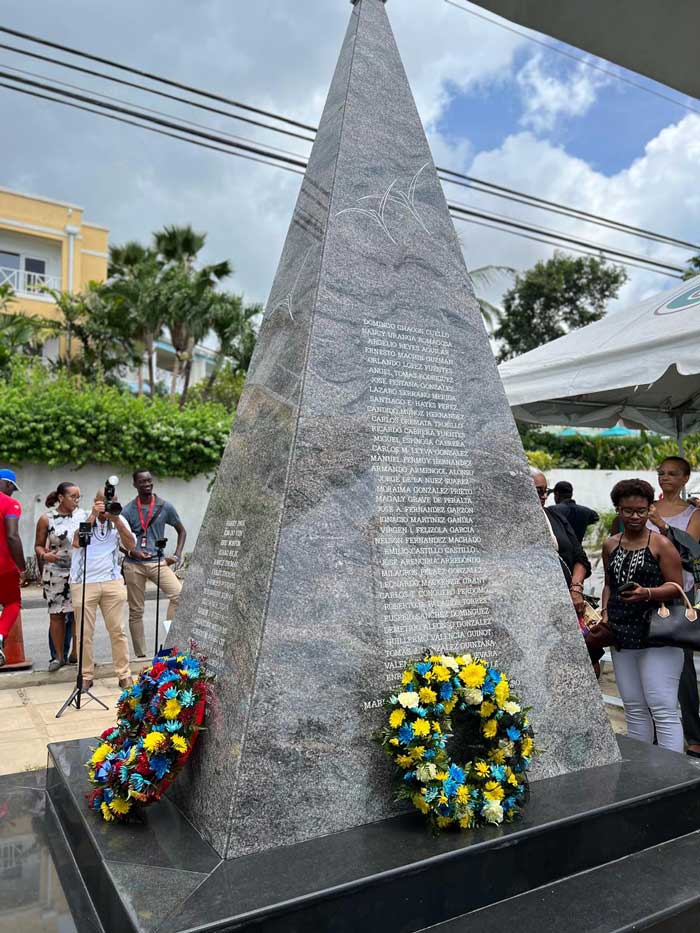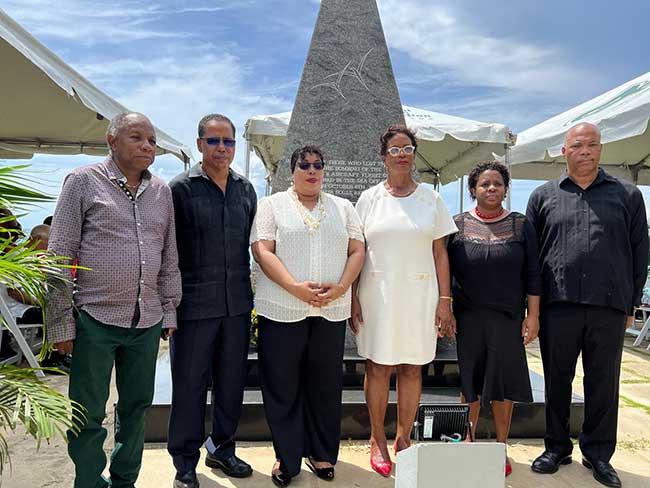BARBADOS | Caribbean Diplomat Condemns Terrorism, Calls for End to Cuba Blockade

BRIDGETOWN, Barbados, October 7, 2024 - In a powerful address marking the 48th anniversary of the Cubana Flight 455 tragedy, Barbados Ambassador to CARICOM David Comissiong delivered a scathing indictment of terrorism and renewed calls for the lifting of the U.S. blockade against Cuba.
The commemoration, held at the Cubana Monument in Paynes Bay, St. James, brought together CARICOM members and Cuban government officials in a solemn tribute to the victims of what Comissiong termed "our Caribbean 9/11."
On October 6, 1976, Cubana Flight 455 crashed off the coast of Barbados after a bomb exploded onboard, claiming 73 lives. The incident, occurring 25 years before the September 11 attacks in the United States, remains a painful memory for the Caribbean community.
"It was an horrific event that traumatized the nation of Barbados," Comissiong said, recounting the grim task faced by Barbadians in retrieving victims' remains from territorial waters. The ambassador's words painted a vivid picture of a paradise shattered by an act of terror that united Cuba, Guyana, North Korea, Venezuela, and Barbados in grief.
Comissiong did not mince words when addressing the lack of justice for the attack's masterminds. "We can't help but profoundly regret that the two masterminds of that horrendous act of terrorism – Orlando Bosch and Luis Posada Carriles—were never properly brought to justice," he stated, noting that both men lived out their final years in the United States, unpunished for their alleged crimes.

Turning his attention to Cuba, Comissiong highlighted the nation's long-standing struggle against what he described as both overt and economic terrorism. He presented stark statistics: 713 reported acts of terrorism against Cuba since the 1959 revolution, resulting in 3,478 deaths and 2,099 injuries. The financial toll, he noted, has reached an estimated $181 billion.
"If there is one Caribbean country that has been the foremost target of terrorism, inclusive of state-sponsored terrorism, both in the distant past and in the here and now, it is the Republic of Cuba," Comissiong asserted. He drew attention to events ranging from the 1960 La Coubre explosion in Havana harbor to the 1998 hotel bombings, linking the latter to Luis Posada Carriles, one of the alleged masterminds behind the Cubana Flight 455 attack.
The ambassador reserved his harshest criticism for the ongoing U.S. trade embargo against Cuba, in place since 1962. Comissiong characterized the blockade as a form of economic terrorism, arguing that it "uses economic violence against civilians and non-combatants to achieve political aims." He pointed out the embargo's devastating effects on Cuban life, from shortages of basic goods to limited access to medical supplies.
Comissiong also took aim at the Trump administration's 2021 decision to place Cuba on the U.S. State Department's list of state sponsors of terrorism. He denounced this move as "cynical, vindictive and fraudulent," asserting that it has only served to compound the hardships faced by the Cuban people.
The Barbadian diplomat's speech then pivoted to the international response to these issues. He highlighted the United Nations General Assembly's consistent voting record, noting that for 32 consecutive years, the vast majority of nations have supported resolutions calling for an end to the U.S. blockade. "On the last occasion that the Resolution was voted on, some 187 nations voted in favour of the Resolution, and only two nations, inclusive of the USA, opposed it," Comissiong stated, underscoring the international community's near-unanimous stance on the issue.
 In a powerful conclusion to his address, Ambassador Comissiong issued a direct challenge to the United States government. "President Biden: the governments and people of the Caribbean Community call upon you to display moral conscience, and to demonstrate respect for International Law and for the nations and people of the World community," he declared, demanding immediate steps to end the blockade and remove Cuba from the list of state sponsors of terrorism.
In a powerful conclusion to his address, Ambassador Comissiong issued a direct challenge to the United States government. "President Biden: the governments and people of the Caribbean Community call upon you to display moral conscience, and to demonstrate respect for International Law and for the nations and people of the World community," he declared, demanding immediate steps to end the blockade and remove Cuba from the list of state sponsors of terrorism.
Comissiong's call to action was bolstered by his reference to Barbados Prime Minister Mia Amor Mottley's recent address to the United Nations General Assembly. He quoted Mottley's passionate plea: "It is unacceptable, it is unconscionable! And that it continues today is a mark on our international conscience." This invocation of the Prime Minister's words underscored the united front presented by Caribbean leaders on this issue.
The Ambassador's speech also highlighted the broader significance of the commemoration. He noted that the Cubana tragedy had been a catalyst for establishing one of the fundamental planks of CARICOM's collective foreign policy: the notion of the Caribbean as a Zone of Peace.
Comissiong referenced the recent CARICOM initiative to designate October 6th as "CARICOM/Cuba Day Against Terrorism," framing it as a day for the entire region to "engage in activities to highlight the evils of terrorism; to evince our collective resolve to condemn and combat all forms of terrorism; and to demonstrate our determination to preserve the Caribbean as a Zone of Peace."
As the ceremony drew to a close, Comissiong's final words resonated with emotion and resolve: "Viva Cuba! Viva Guyana! Viva Barbados! Viva CARICOM! Forward ever! Backward never!" The crowd's response was reportedly enthusiastic, reflecting the impact of the Ambassador's impassioned address.
The commemoration at the Cubana Monument served not only as a solemn remembrance of a tragic event but also as a platform for addressing ongoing regional concerns.
Ambassador Comissiong's speech, with its blend of historical reflection, current geopolitical analysis, and calls for action, underscored the complex interplay of past traumas and present challenges in shaping Caribbean diplomacy and international relations.
As attendees dispersed from the monument, the Ambassador's words lingered, a potent reminder of the enduring impact of the Cubana Flight 455 tragedy and its relevance to contemporary Caribbean and global affairs.
The event highlighted the region's ongoing commitment to combating terrorism in all its forms while advocating for justice and peace on the international stage.
-30-
